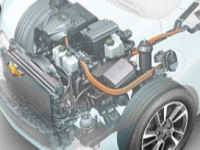RANGE

The projects that comprise ARPA-E's RANGE Program, short for "Robust Affordable Next Generation Energy Storage Systems," seek to develop transformational electrochemical energy storage technologies that will accelerate the widespread adoption of electric vehicles by dramatically improving their driving range, cost, and safety. RANGE focuses on four specific areas 1) aqueous batteries constructed using water to improve safety and reduce costs, 2) non-aqueous batteries that incorporate inherent protection mechanisms that ensure no harm to vehicle occupants in the event of a collision or fire, 3) solid-state batteries that use no liquids or pastes in their construction, and 4) multifunctional batteries that contribute to both vehicle structure and energy storage functions.
Driving range, safety, and cost remain the biggest hurdles in the way of mass electric vehicle (EV) adoption. The RANGE program seeks to enhance safety, maximize the overall energy stored in a vehicle, and minimize manufacturing costs. To accomplish this, energy storage systems must be "robust", meaning they must use chemistries or designs that prevent overheating or dangerous electrical discharges in the event of vehicle accidents or manufacturing defects. Robustness reduces the need for heavy protective components that would otherwise contribute to the weight of a vehicle, causing greater energy expenditure. Integrating safer, lighter batteries into the structure of a vehicle results in a more favorable energy-to-weight ratio. This multifunctional design results in reduced weight of the vehicle, which leads to improved driving range.
If successful, RANGE technology would reduce the overall weight of the vehicle and battery to provide greater EV driving range, minimize the impact of a battery failure, and enable greater design flexibility for vehicle manufacturers.
The mass adoption of EVs would diminish the demand for petroleum, dramatically reducing U.S. dependence on foreign oil.
Greater use of EVs would reduce U.S. greenhouse gas emissions, 28% of which come from the transportation sector.
Technological advancements from the RANGE program could enable EVs to travel significantly further on a single charge at a much lower cost than that of current EVs and conventional vehicles.


